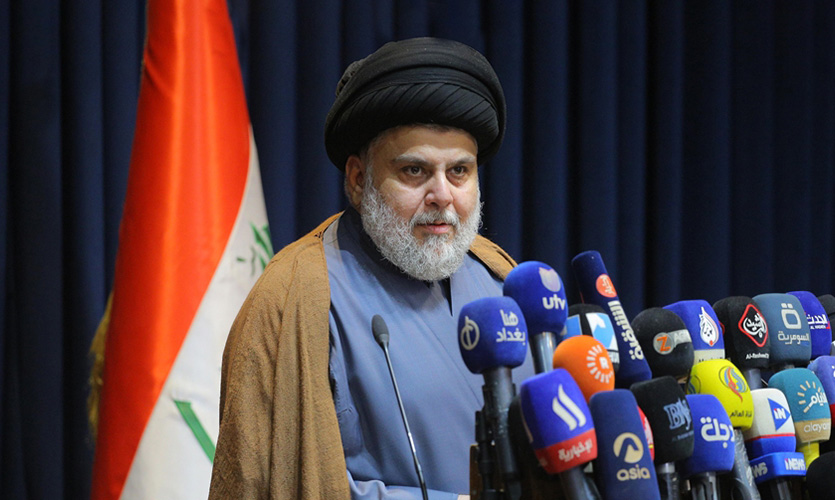Despite Iraq’s two-decade democratic experiment, fighting among political factions could soon lead to civil war, as Muqtada al-Sadr’s resignation and clashes have revealed the bitterness of the Shi’ite power struggle. A rival Shiite bloc – the pro-Iran Coordination Framework – clashed with supporters of cleric al-Sadr, in Baghdad’s latest violence. The green zone of Baghdad was the scene of an exchange of heavy gunfire between both groups.
In the gunfire that erupted during Monday’s clashes, at least 17 people were killed and close to 100 were wounded. According to AFP, doctors stated that at least 15 of al-Sadr’s followers had been killed by gunfire, and approximately 350 other protesters had been hurt. Several media outlets have reported that the heavily fortified green zone has become a besieged area.
Who Is al-Sadr?
For more than two decades, Muqtada al-Sadr has been a dominant figure in Iraqi public and political life. His Mahdi Army emerged as one of the most powerful militias, which fought the US and allied Iraqi government forces in the aftermath of the invasion that toppled former ruler Saddam Hussein. Eventually, he rebranded them as the Peace Brigades, who remain one of the biggest militias in Iraq.
With his black turban, dark eyes, and bulky physique, al-Sadr, one of Iraq’s most recognisable personalities, spoke up for common Iraqis who were suffering from high unemployment, frequent power outages, and corruption. He is one of the select few individuals capable of drawing down hundreds of thousands of fans after immediately mobilising them onto the streets. Since being stormed twice in protest of the impasse in July and August, hundreds have set up camp outside the legislature.
Formerly an ally of Iran, al-Sadr cut ties with Iraq’s Shia neighbour and recast himself as a patriot, seeking to halt US and Iranian meddling in the country’s domestic affairs.
What Has Caused The Clash?
Clashes broke out after Muqtada al-Sadr resigned. Overnight, the Iraqi capital witnessed some of the worst violence in recent years as fighters exchanged gunfire, and tracer rounds illuminated the night sky. Supporters of his party are demanding new elections. A government complex in Baghdad that was once the palace of Saddam Hussein was stormed by the militants in response. The crisis was set off about a year ago, when al-Sadr and his supporters – the “Sadrists” – rejected a power-sharing deal with other factions. Although the al-Sadr block won the elections that were held in October, he withdrew all of his MPs in June, leaving Iraq in a state of political uncertainty. He had demanded that no politician in the government, after the 2003 US invasion, should continue in their respective position. Mustafa al-Kadhemi was chosen as the new prime minister, and a caretaker administration was established.
Experts who talked to the Wall Street Journal and Arab News claimed that al-Sadr’s retirement is what precipitated the riots, but they also noted that the cleric was forewarned that such a situation would arise. Additionally, they said that his resignation and lack of planning allowed his followers to act however they pleased. Hamzeh Hadadm of the European Council on Foreign Relations was quoted as stating, “The more terrifying thought on this is that he is giving his followers the green light to do whatever they like.”
What Are The Reactions From Iraqis?
Iraqis said that the internal strife had little to do with the problems that plague them on a daily basis because of droughts, rising costs, unemployment, power outages, and a failing economy. Their primary concerns are a lack of access to water and deteriorating infrastructure.
Baghdad’s green zone, which is home to both government facilities and international embassies, has seen the most violence. Due to the confrontations, the Dutch embassy personnel were compelled to transfer to the German mission.
Security authorities said that part of the fighting had taken place between the Iraqi military, the Coalition Framework and the Peace Brigades. Former Iraqi Prime Minister Nouri al-Maliki is in charge of the coalition framework, an association of rival Shia parties. Before any new polls are conducted, the Coalition Framework intends to designate a head of state. Social media videos appeared to show some combatants employing powerful weapons, such as rocket-propelled grenades (RPGs).
In the middle of the conflict, Iran has shut its borders with Iraq, while Kuwait has asked its residents to evacuate the nation immediately. In addition, Mustafa al-Kadhimi, the interim prime minister of Iraq and a supporter of al-Sadr, has imposed a statewide curfew following violence in a number of other cities. He has called on the powerful cleric to step in and put a halt to the violence, while also suspending cabinet sessions.
Muqtada al-Sadr declared that he would go on a hunger strike unless “sons from all sides” stopped using violence. In his statement on Monday, he said, “I had decided not to interfere in political affairs, but I now announce my final retirement and the closure of all [Sadrist] institutions.” Some religious sites linked to his movement will remain open.
Read more: Mariupol POW Hearings In Ukraine May Disregard Combatant Immunity, Says OHCHR










